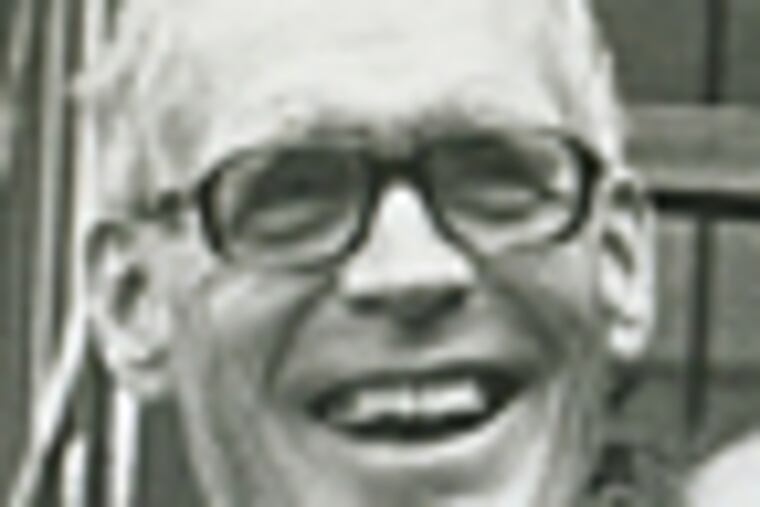Harry G. Toland, 89, Bulletin labor reporter
HARRY TOLAND was a most unlikely labor reporter. Chestnut Hill born and bred, Episcopal Academy, Yale University English major. But when Stanley Thompson, the Evening Bulletin's city editor, broached the idea to him on, oddly enough, Groundhog Day in 1952, Harry mumbled an uncertain yes.

HARRY TOLAND was a most unlikely labor reporter.
Chestnut Hill born and bred, Episcopal Academy, Yale University English major. But when Stanley Thompson, the Evening Bulletin's city editor, broached the idea to him on, oddly enough, Groundhog Day in 1952, Harry mumbled an uncertain yes.
Tall and gangly, impeccably mannered and gracious, Harry was no Vic Riesel, the labor activist and columnist. Nobody was going to throw acid in his face.
Besides, this was Philadelphia. The boys might get a little excited and shout a lot, but they didn't resort to violence.
The beat turned out to be a little more dramatic than simply trying to talk with the Transport Workers' salty Mike Quill as he stumped along a hotel corridor with his blackthorn walking stick during a transit strike.
In 1952, Harry found out that a man named Abraham Goldberg, who had been convicted of extortion and barred from union activity for two years, was trying to organize workers in a Camden toy factory for a union run by notorious racketeers.
When Goldberg found out that Harry was writing a story about him, he told the reporter that if the story ran he would jump off the Benjamin Franklin Bridge.
Harry went to Stanley Thompson and asked what they should do. Run it, Thompson said, and if he jumps, "that'll give us a second-day story."
Goldberg didn't jump.
In a collection of Bulletin reminiscences called Nearly Everybody Read It, Harry wrote: "Given a choice of beats, mine at that moment would not have been labor. But for the seven years I covered it, I found it the pick of the lot, the place to be in the 1950s."
Harry G. Toland, who went on to excel at other positions at the Bulletin, including editorial writer, and wrote a number of books in retirement, died Jan. 31. He was 89 and lived in Wallingford, Delaware County.
Thompson, one of the last of the cranky old city editors, assigned Harry to cover the CIO convention in Pittsburgh in 1952, at which a new president was to be elected. Harry asked Thompson what he was looking for.
"The juicy, inside stuff," Thompson replied.
Harry wound up hiding in a closet with a Wall Street Journal reporter to listen in on a secret meeting with Mike Quill, who was trying to work out a deal to have Allan Haywood elected against the United Auto Workers' Walter Reuther.
"Hiding in this stuffy cubicle and scribbling notes in the dark, we had no trouble picking up the unionist's piercing County Kerry brogue booming through the wall," Harry wrote.
After the journalists reported the Quill ploy, Reuther was elected.
In January 1953, Quill's Transport Workers Union threatened to strike the city's transit system, but a tentative agreement was reached with Mayor Joseph S. Clark.
The Inquirer put out an eight-column headline: "No PTC Strike." But the union members hadn't yet ratified the deal, and at a loud meeting covered by Harry in the old Metropolitan Opera House building, on North Broad Street, the newspaper front page was paraded down the aisles to cries of, "Says who?"
The strike lasted four days, paralyzing the city. Harry reported that Quill, who had negotiated the tentative deal, was huffing that the strike had been started by "drunks, punks and blowhards."
The Bulletin sometimes had a bizarre way of doing things. In 1958, when the Teamsters struck the paper for five weeks, coverage was written not by reporters but by the executive offices, with nothing from the union side.
After the strike, Harry and other reporters asked publisher Robert McLean what would happen if the union called to give its position.
"I think they will find," McLean said with a smile, "that the line is busy."
When Harry moved into the editorial offices, he was confronted with the Bulletin's famous and often-derided policy of wishy-washy editorials.
In 1955, when Richardson Dilworth ran for mayor against Thacher Longstreth, the Bulletin seemed to endorse Dilworth, but when Harry mentioned it to the candidate, Dilworth famously asked, "How could you tell?"
Harry saw that one of his jobs was to make the editorials actually say something. He felt that he had succeeded when he wrote laudatory editorials about Dilworth when he became president of the Board of Education.
"I was probably friendlier to Dilworth than I should have been," he wrote, still unable to completely shake off the Bulletin's editorial-page ambiguity. "I still have some postcards he sent me from trips."
Harry began his newspaper career at the Pottstown Mercury after serving as a Marine officer in the South Pacific in World War II. He started at the Bulletin in 1949 and retired in 1982.
He is survived by his wife of 64 years, Harriet; a son, Robert 2nd; three daughters, Margaret, Deborah and Phoebe; two brothers, two sisters, six grandchildren and five great-grandchildren.
Services: Were Feb. 5.